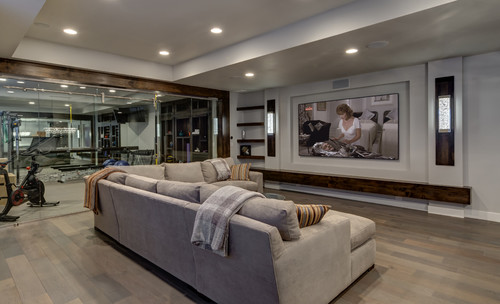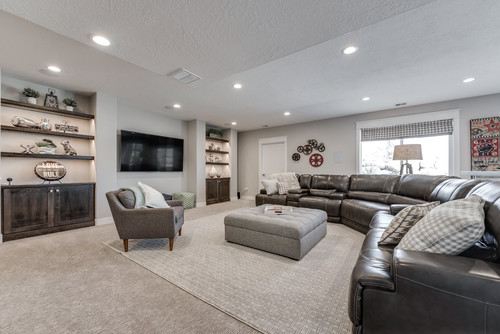How Much Value Does a Finished Basement Add?
One of the questions we often get is “will finishing my basement add value to my home?” This question is often followed by “how much value will a finished basement add to my home?” Finished basements can add a lot of extra living space, so it is understandable that so many homeowners choose to renovate the space under their homes.
Whether you want to add an extra bedroom, a theater, a workout space or rec room, the basement gives you options that you otherwise wouldn’t have – unless you were to add an above-ground addition to the home, which would be significantly more expensive. Besides adding space, a finished basement will also increase the value of your home.
It is important, however, to recognize that you probably won’t get a dollar for dollar return on your investment. According to the 2017 Remodeling Cost vs. Value Report (costvsvalue.com), a basement remodel is one of the top ten home improvement projects that provide a return on your investment (ROI) of approximately 60-70% on average.
While basements are evaluated differently than above-ground space, something to consider when you are thinking about remodeling. Basements, are improvements that increase home value. The finished area in the lower level of your home will add value to the value of your home; it just won’t be the same as above grade space on a dollar per square foot basis.
Basements, however, can be very attractive areas to finish due to the amount of square footage you can add to your home and relatively inexpensively vs. adding an addition (approximately $20-$35K versus $100-$125K. While the value added to your home from finishing your basement may not be as much as you were hoping for, you will save money by adding living space under the house as opposed to above-ground.
Building an addition above-ground is expensive, while the basement already has a floor, walls, and a roof (in this case ceiling) direct access to wiring, plumbing, and a roof – making it relatively affordable to renovate.
Understanding How Finished Basements Are Valued
When an appraiser considers the value of a home, s/he needs to make apples to apple comparisons – which means that living space above-grade (above-ground) is valued separately from space below-grade (below-ground). Space above-ground is worth more as the cost of finished basement space is significantly less expensive to add than above grade living area.
If there is a home similar in features to your own with equivalent square footage, similar finishes and in the same neighborhood, the value of both homes would be proximal. But if a quarter of your square footage is in the finished basement – below grade living space – then the value of your home would be below that of the neighboring home offering it’s finished space all above-grade.
You can find various estimates of the value of basements, ranging between 50% and 70% of the above-ground value. While these estimates are useful to get an idea of what your finished basement will be worth, you will need to talk with a real estate agent or appraiser working in your particular area to get a clearer picture of how much value you can expect to get from your basement finishing / renovations.
Estimates are just that! Never use an estimate to assign a value to your home. It is advisable to reach out to a local appraiser or professional real estate agent to understand how much value a basement will add to your home.
In addition, DO NOT use Automated Valuations Models (AMVs) such as Zillow Zestimates as a means of valuing your home!
Zillow itself has always claimed that Zestimates are estimates of market value and are a starting point to determining a home’s value and this is a sure fire way to inaccurately access not only your property value, but the value of your basement space as well. Zillow relies on inaccurate and unverified data and should not be relied on for important financial decisions regarding your home!
Types of Basement Space Have Different Values
The type of finished space in the lower level of your home can have an enormous impact on your home’s value as well. The grading on your home’s lot will determine the style of basement and the value of your finished basement. The three types are:
- A full walk-out basement – this is the most valuable type of finished basement allowing for a sliding glass or atrium door with direct access to your rear or side yard, as well as multiple regular size egress windows, not to mention a space that is partially at grade. A full walk-out basement allows you to have a significant amount of natural light. With natural light, a finished lower level often does not feel like a basement at all.
- A partial drop in grade – with this set up you are still able to have some full-size windows. However, you may or may not have the ability to have a full-size entry/exit door if the grade of the land does not allow for it. This type of set up is not quite as attractive as a full walk-out lower level. The other term used for this situation is a garden level lot.
- A non-walk-out basement – this is the least attractive type of basement space offering a space that is entirely below grade, typically with quarter size windows allowing for minimal light.
While these are three types of basements based on lot grading, there is also other general characteristics that can impact the value of a basement including level of finish. For example, does the area have a “drop ceiling” or is it plastered, does it have the same finish trim work and doors as the rest of the home? The more a basement feels like above grade space, the better value it will command!
Basement Improvement Options – Personalized Vs Resale Value
When you are deciding how to finish the basement, you will need to weigh your desire to have exactly what you want with the future resale value and what the typical home buyer will want.
Adding things like a flex space that could serve as a media room, rec space, etc., bedrooms (to be considered a bedroom for appraisal purposes the space much include an egress window and a closet), and a bathroom are recommended features. Creating space that is flexible and could serve multi-uses is recommended. If you add a bedroom you will also want to add a full bath to enhance the value and avoid an appraiser docking the value due to a lack of functionality.
The more specialized you get, such as a dedicated home theater (with multi-tier seating, paneled walls, etc), workout rooms (with mirrored walls, rubber mat floors, etc), wine cellars, etc., the greater chance you will limit the marketability of your home (some buyers simply will not value and be willing to pay for these features). They may have no interest in these additions, and/or not be wiling to pay for them. The opposite could be true with some of the features mentioned depending on where your home is located, it’s price point and what local buyers want. While a dedicated home theater or yoga space in New Albany for buyers looking in the $750k-$1M range could be a selling point, it is likely to be significantly less appealing in a buyer in Grove City in the $300-$600K range.
Good Lighting, Walk-able Space, and Proper Drainage
Whatever configuration you choose for your finished basement, ample lighting and ceilings at least 8 feet tall should be included throughout the area. Neither you nor any new owners will want to spend time in the basement if it is too dark. You want lots of light to make the space comfortable. Ceilings need to be 8 feet or higher.
If 8 foot or higher ceilings are not possible, it is probably better to save your money and avoid finishing the area. Digging down to create more room is generally not a good idea, as it can be expensive and you risk undermining the structure of the house.
If you are considering finishing your basement make sure that you plan ahead for any water or moisture issues. One of the biggest nightmares you will deal with is pouring a ton of money into your lower level, only to find out you have a water problem. Take the time to seal any foundation cracks and if need be install French drains, a sump pump AND A BATTERY BACKUP for your sump pump. Spending the money on these items is the kind of insurance that is well worth it!
Lastly be sure to take out a construction permit for work done on your basement. Your home will be much harder to sell when it comes time to sell and depending on your municipality, you may even be forced to rip out walls!
What Are Popular Finished Basement Features?
In Columbus and Central Ohio, there are certain features that buyers appreciate and love to find in a finished basement space. Here are some of the popular uses for a basement:
- Guest Bedroom – some buyers don’t need a full in-law suite but a place for an occasional guest or family member who visits every now and again. If the home has a walk-out basement it’s even more appealing.
- Theater / Media Room – Some of the theaters in homes today are just incredible. You don’t even need to go to the movies anymore to get a similar kind of experience in your own home. Dedicated theater rooms are a great feature in luxury homes, however, in starter to mid tier homes a better option is a Media Room, which is simply a more open space similar to a family room but includes a large High Definition flat panel TV or Projector, surround sound and comfortable sofas, as opposed to an enclosed Theater Room with multi-tier theater style seating.
- Wet Bar – The wet bar has become a very popular feature to have in any home and tends to feature a sink, mini or full sized refrigerator and/or wine cooler and a microwave. These spaces work great for entertaining the guys, when the kids have friends over, and a space to serve theater/media rooms, home gyms, etc.
- Play / Rec Room – there are lots of buyers who want a place for their kids to hang out with friends. Even if buyers have younger kids, a finished basement allows the perfect opportunity to get the toys and games out of other areas of the home.
- Work Out Room or Home Gym – There are lots of buyers who love the thought of being able to work out in their own home rather than joining a gym. Home gyms are a great feature to have for numerous buyers in a finished basement space.
As mentioned above, just remember some buyers may or may not be willing to pay for these kind of basement features.
Watch Out For Agents Who Make Valuation Mistakes
If you are thinking of selling your home and have a finished basement, you are probably wondering how much value it adds and therefore how to price your home. Pricing a home correctly is an art and a skill. Unfortunately, many real estate agents simply do not know how to accurately price a home. When there is finished basement involved the chances for error increase even more.
Making valuation mistakes happens more frequently with finished basements as many agents simply lump the finished basement space into the home’s overall square footage failing to break these out to finished above and below grade living space, while others fail to account for it at all (if an agent fails to request the details on the size of the finished basement living space this is a good indication they do not know how to value this space and will be unable to effectively value and market your home). This is a HUGE mistake. As mentioned previously, finished basement space does not have the same value as above grade space!
As an example, lets say there are two homes located in the same neighborhood with similar amenities and features. Home “A” has 3000 square feet all above grade. Home “B” has 2500 square feet above grade and 500 square feet in a finished lower level. All other things being equal home “A” will have a higher value than home “B”. Home “A” is worth more because above grade space is considered more valuable.
There are some agents who would incorrectly use these two homes as “comps” and justify the value based on gross living area. This is why price per square foot is not a good value indicator. Real Estate agents who use price per square foot as a means to value a property almost always get the price wrong.
From Fannie Mae appraisal guidelines on how appraisers should value finished basement space:
“Rooms that are not included in the above-grade room count may add substantially to the value of a property, particularly when the quality of the finish is high. For that reason, the appraiser should report the basement or other partially below-grade areas separately and make appropriate adjustments for them on the Basement & Finished Rooms Below-Grade line in the Sales Comparison Approach adjustment grid.
For consistency in the sales comparison analysis, the appraiser should compare above-grade areas to above-grade areas and below-grade areas to below-grade areas.” This is how a real estate agent should value a basement as well!
Valuation needs to be done “apples to apples”. Sold properties should be emphasized along with homes under contract. What is for sale is important but not nearly as much as what has sold. Homes listed For Sale represent the current competition and not necessarily what buyers have recently been willing to pay for a property. Sold properties offer concrete data points that can be used to establish accurate values.
Should You Finish The Basement If You Are Planning To Sell?
A finished basement is not a clear winner when it comes to possible renovations that aid in selling a home. Sure, you can spend the money and hope that buyers will get excited about the improvement, but chances are you will not receive a dollar for dollar return on your investment, let alone a return beyond your investment. In short, there is no guarantee that you will make back all of your money from the renovations.
If you are planning on staying in the home for several years, or longer, offering the opportunity to not only enjoy your investment but also for home values to further appreciate, finishing the basement tends to make more sense. You should enjoy your home while you are living there. If a finished basement will improve your living experience over the long-term, it could be worth the money and the effort.
Talk To Your Realtor
If you’re considering selling your home and are interested in determining what renovations offer the highest return on investment and what you can do to maximize your home’s value and fetch the highest price possible.
Many home owners are under the mistaken impression that renovations and additions just add to the price of their home. In reality, there are only certain improvements that are worth the investment. Talk to a professional real estate agent or two before you make any big decisions about adding to your home.
Additional Helpful Real Estate Resources
- Appraisal rules for evaluating basements via Appraiser Tom Horn.
- What home improvement projects add value via Kyle Hiscock at Behance.
Use the additional resources to see how a finished basement and other improvements affect the value of a home.






